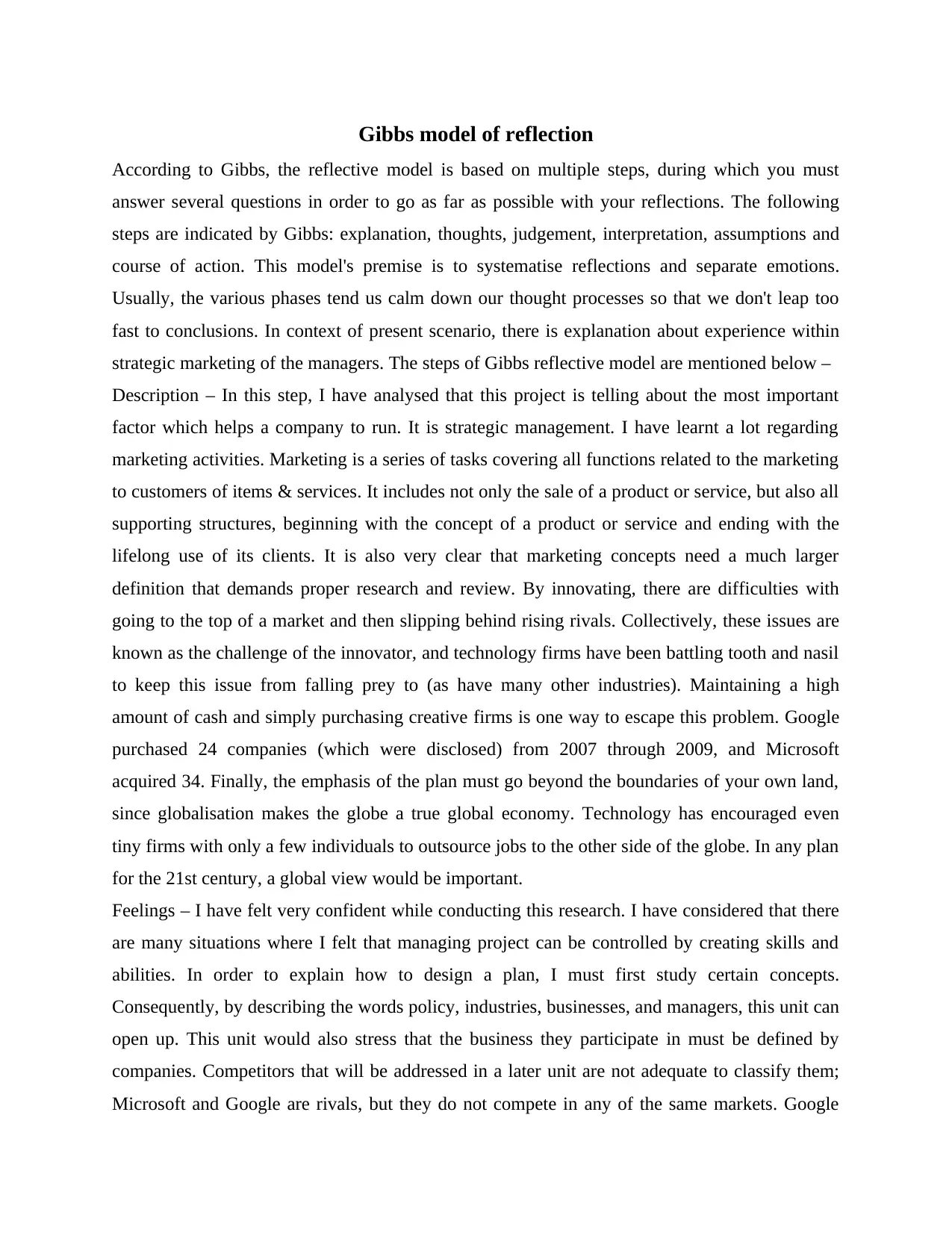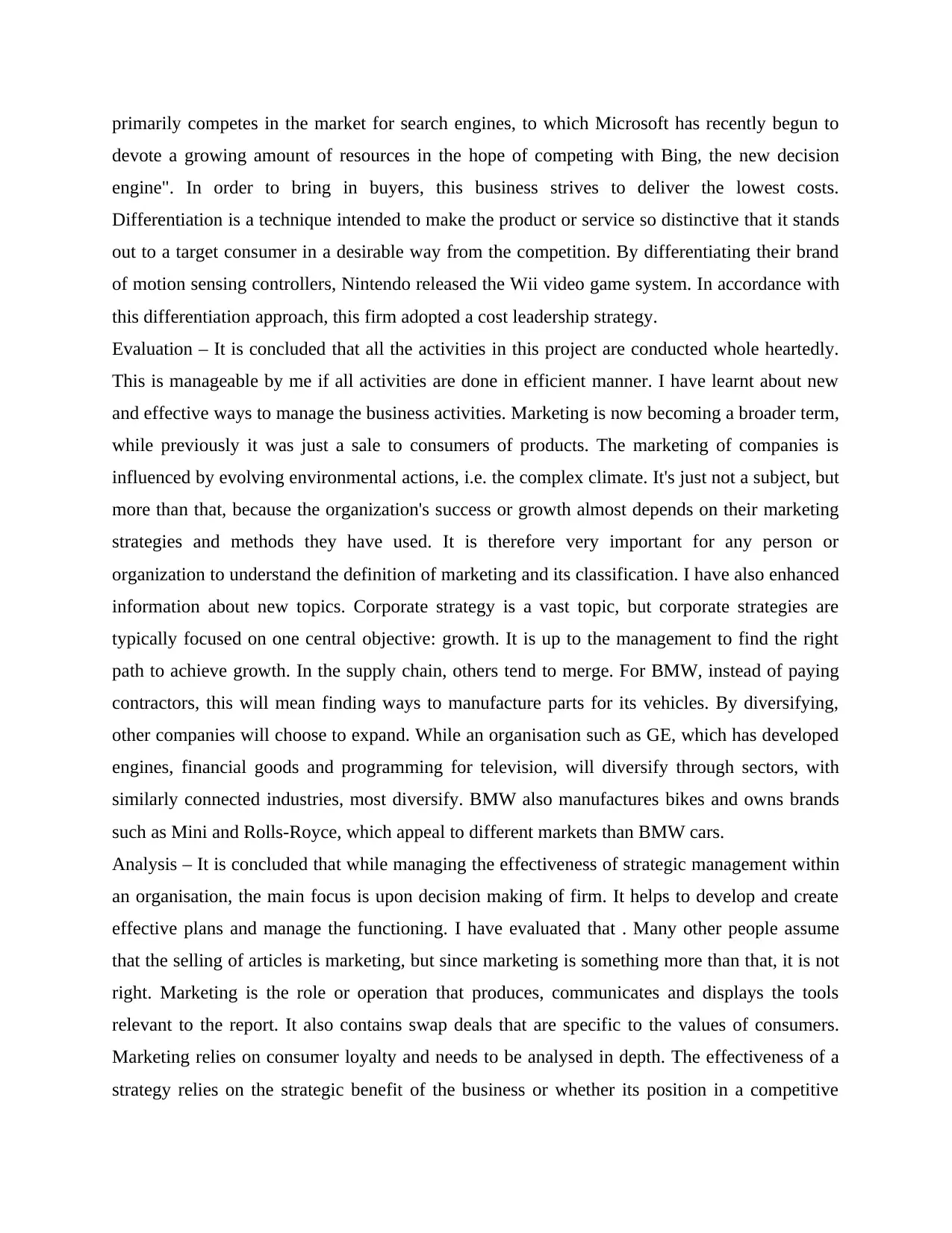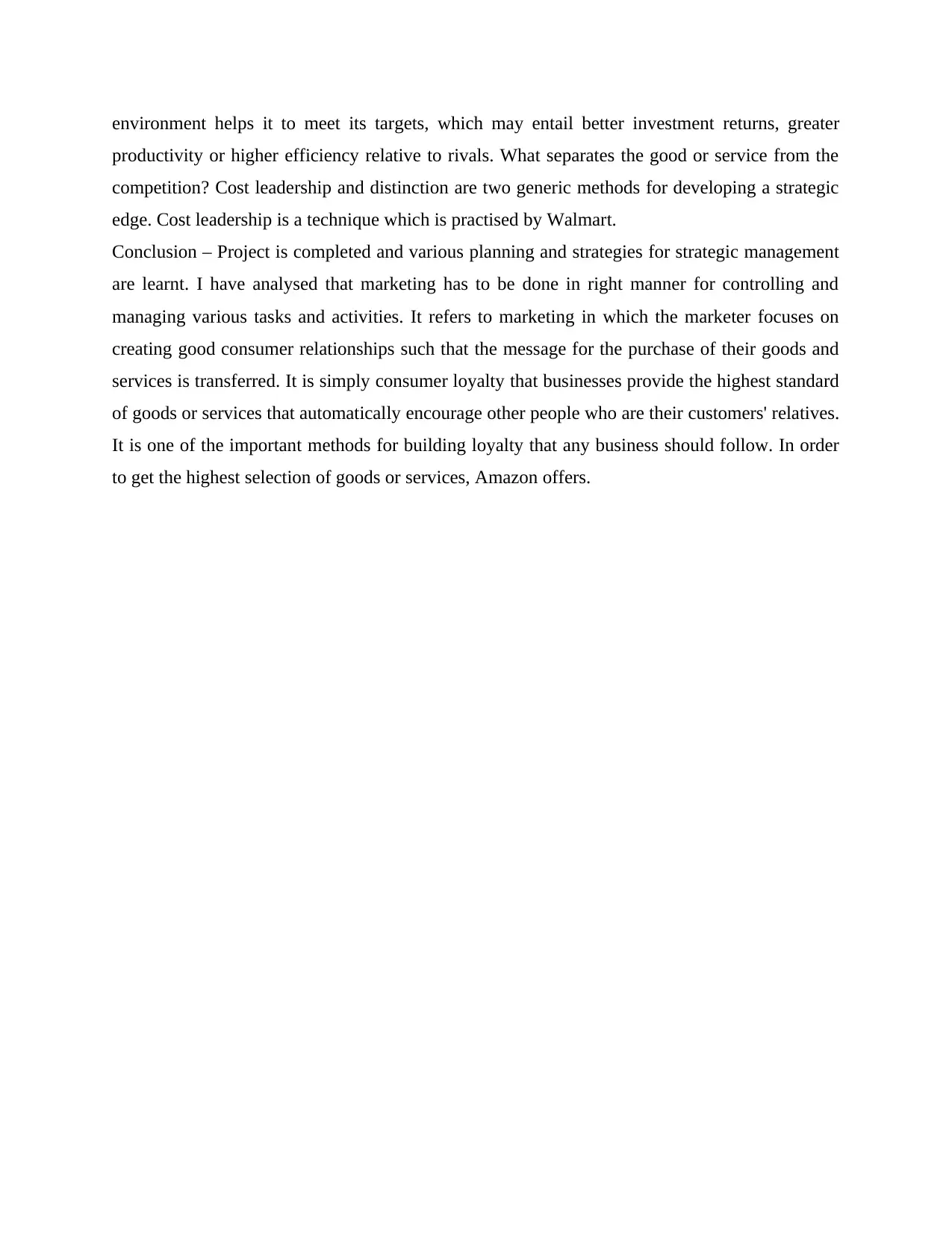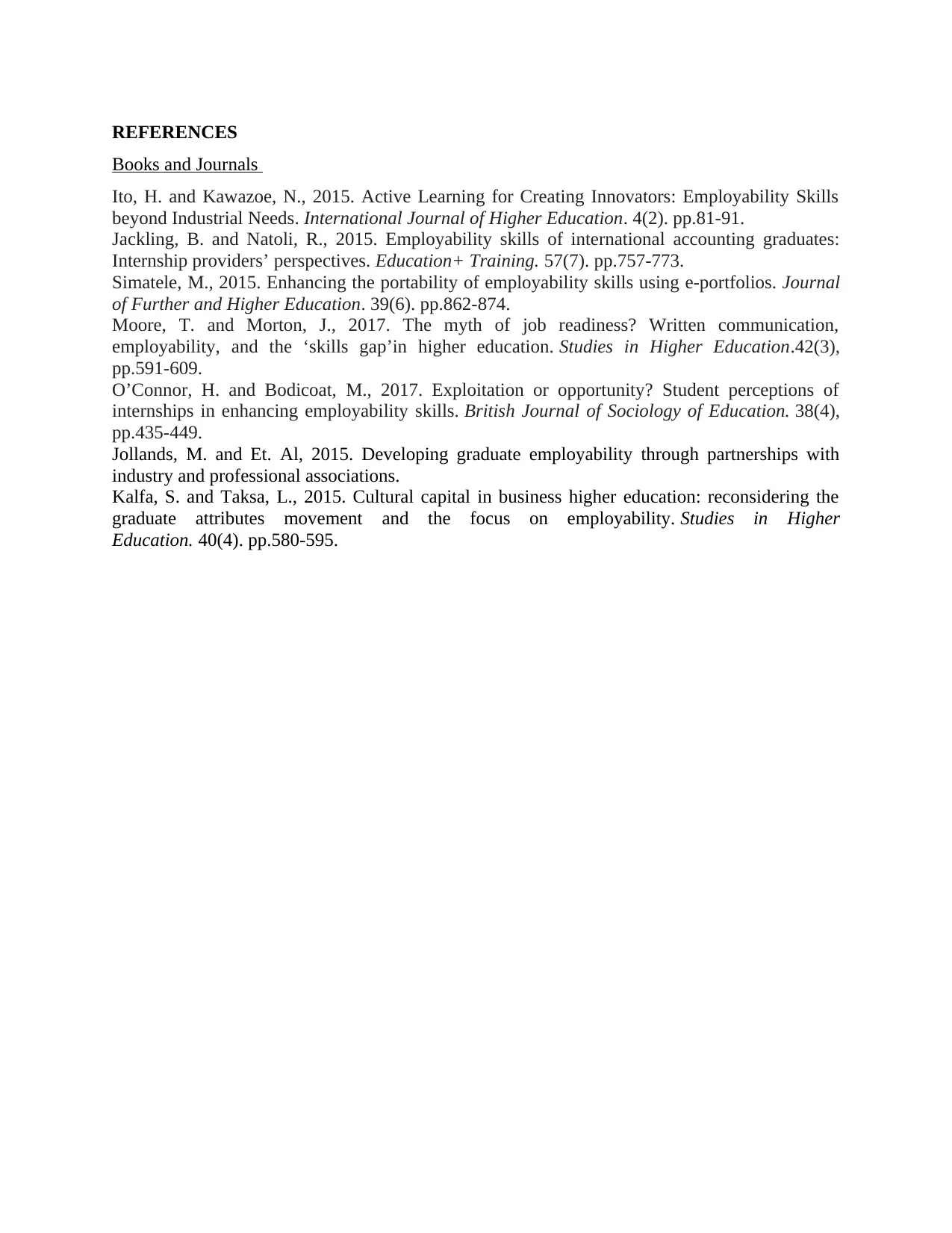Strategic Marketing Reflection: Gibbs Model and Business Strategies
VerifiedAdded on 2023/01/03
|6
|1482
|72
Report
AI Summary
This report presents a student's reflection on strategic marketing, employing the Gibbs model to analyze various aspects of business activities. The report begins with a description of the project, highlighting the importance of strategic management and marketing activities within a company. It then delves into the student's feelings and evaluation of the project, discussing the application of marketing concepts, differentiation strategies, and cost leadership. The analysis section focuses on decision-making within firms and the role of marketing in creating, communicating, and displaying relevant information. The conclusion summarizes the student's learning experience, emphasizing the importance of consumer relationships and loyalty in marketing. The report also includes references to relevant academic sources.

Reflection
Paraphrase This Document
Need a fresh take? Get an instant paraphrase of this document with our AI Paraphraser

Table of Contents
Gibbs model of reflection................................................................................................................3
REFERENCES................................................................................................................................5
Gibbs model of reflection................................................................................................................3
REFERENCES................................................................................................................................5

Gibbs model of reflection
According to Gibbs, the reflective model is based on multiple steps, during which you must
answer several questions in order to go as far as possible with your reflections. The following
steps are indicated by Gibbs: explanation, thoughts, judgement, interpretation, assumptions and
course of action. This model's premise is to systematise reflections and separate emotions.
Usually, the various phases tend us calm down our thought processes so that we don't leap too
fast to conclusions. In context of present scenario, there is explanation about experience within
strategic marketing of the managers. The steps of Gibbs reflective model are mentioned below –
Description – In this step, I have analysed that this project is telling about the most important
factor which helps a company to run. It is strategic management. I have learnt a lot regarding
marketing activities. Marketing is a series of tasks covering all functions related to the marketing
to customers of items & services. It includes not only the sale of a product or service, but also all
supporting structures, beginning with the concept of a product or service and ending with the
lifelong use of its clients. It is also very clear that marketing concepts need a much larger
definition that demands proper research and review. By innovating, there are difficulties with
going to the top of a market and then slipping behind rising rivals. Collectively, these issues are
known as the challenge of the innovator, and technology firms have been battling tooth and nasil
to keep this issue from falling prey to (as have many other industries). Maintaining a high
amount of cash and simply purchasing creative firms is one way to escape this problem. Google
purchased 24 companies (which were disclosed) from 2007 through 2009, and Microsoft
acquired 34. Finally, the emphasis of the plan must go beyond the boundaries of your own land,
since globalisation makes the globe a true global economy. Technology has encouraged even
tiny firms with only a few individuals to outsource jobs to the other side of the globe. In any plan
for the 21st century, a global view would be important.
Feelings – I have felt very confident while conducting this research. I have considered that there
are many situations where I felt that managing project can be controlled by creating skills and
abilities. In order to explain how to design a plan, I must first study certain concepts.
Consequently, by describing the words policy, industries, businesses, and managers, this unit can
open up. This unit would also stress that the business they participate in must be defined by
companies. Competitors that will be addressed in a later unit are not adequate to classify them;
Microsoft and Google are rivals, but they do not compete in any of the same markets. Google
According to Gibbs, the reflective model is based on multiple steps, during which you must
answer several questions in order to go as far as possible with your reflections. The following
steps are indicated by Gibbs: explanation, thoughts, judgement, interpretation, assumptions and
course of action. This model's premise is to systematise reflections and separate emotions.
Usually, the various phases tend us calm down our thought processes so that we don't leap too
fast to conclusions. In context of present scenario, there is explanation about experience within
strategic marketing of the managers. The steps of Gibbs reflective model are mentioned below –
Description – In this step, I have analysed that this project is telling about the most important
factor which helps a company to run. It is strategic management. I have learnt a lot regarding
marketing activities. Marketing is a series of tasks covering all functions related to the marketing
to customers of items & services. It includes not only the sale of a product or service, but also all
supporting structures, beginning with the concept of a product or service and ending with the
lifelong use of its clients. It is also very clear that marketing concepts need a much larger
definition that demands proper research and review. By innovating, there are difficulties with
going to the top of a market and then slipping behind rising rivals. Collectively, these issues are
known as the challenge of the innovator, and technology firms have been battling tooth and nasil
to keep this issue from falling prey to (as have many other industries). Maintaining a high
amount of cash and simply purchasing creative firms is one way to escape this problem. Google
purchased 24 companies (which were disclosed) from 2007 through 2009, and Microsoft
acquired 34. Finally, the emphasis of the plan must go beyond the boundaries of your own land,
since globalisation makes the globe a true global economy. Technology has encouraged even
tiny firms with only a few individuals to outsource jobs to the other side of the globe. In any plan
for the 21st century, a global view would be important.
Feelings – I have felt very confident while conducting this research. I have considered that there
are many situations where I felt that managing project can be controlled by creating skills and
abilities. In order to explain how to design a plan, I must first study certain concepts.
Consequently, by describing the words policy, industries, businesses, and managers, this unit can
open up. This unit would also stress that the business they participate in must be defined by
companies. Competitors that will be addressed in a later unit are not adequate to classify them;
Microsoft and Google are rivals, but they do not compete in any of the same markets. Google
⊘ This is a preview!⊘
Do you want full access?
Subscribe today to unlock all pages.

Trusted by 1+ million students worldwide

primarily competes in the market for search engines, to which Microsoft has recently begun to
devote a growing amount of resources in the hope of competing with Bing, the new decision
engine". In order to bring in buyers, this business strives to deliver the lowest costs.
Differentiation is a technique intended to make the product or service so distinctive that it stands
out to a target consumer in a desirable way from the competition. By differentiating their brand
of motion sensing controllers, Nintendo released the Wii video game system. In accordance with
this differentiation approach, this firm adopted a cost leadership strategy.
Evaluation – It is concluded that all the activities in this project are conducted whole heartedly.
This is manageable by me if all activities are done in efficient manner. I have learnt about new
and effective ways to manage the business activities. Marketing is now becoming a broader term,
while previously it was just a sale to consumers of products. The marketing of companies is
influenced by evolving environmental actions, i.e. the complex climate. It's just not a subject, but
more than that, because the organization's success or growth almost depends on their marketing
strategies and methods they have used. It is therefore very important for any person or
organization to understand the definition of marketing and its classification. I have also enhanced
information about new topics. Corporate strategy is a vast topic, but corporate strategies are
typically focused on one central objective: growth. It is up to the management to find the right
path to achieve growth. In the supply chain, others tend to merge. For BMW, instead of paying
contractors, this will mean finding ways to manufacture parts for its vehicles. By diversifying,
other companies will choose to expand. While an organisation such as GE, which has developed
engines, financial goods and programming for television, will diversify through sectors, with
similarly connected industries, most diversify. BMW also manufactures bikes and owns brands
such as Mini and Rolls-Royce, which appeal to different markets than BMW cars.
Analysis – It is concluded that while managing the effectiveness of strategic management within
an organisation, the main focus is upon decision making of firm. It helps to develop and create
effective plans and manage the functioning. I have evaluated that . Many other people assume
that the selling of articles is marketing, but since marketing is something more than that, it is not
right. Marketing is the role or operation that produces, communicates and displays the tools
relevant to the report. It also contains swap deals that are specific to the values of consumers.
Marketing relies on consumer loyalty and needs to be analysed in depth. The effectiveness of a
strategy relies on the strategic benefit of the business or whether its position in a competitive
devote a growing amount of resources in the hope of competing with Bing, the new decision
engine". In order to bring in buyers, this business strives to deliver the lowest costs.
Differentiation is a technique intended to make the product or service so distinctive that it stands
out to a target consumer in a desirable way from the competition. By differentiating their brand
of motion sensing controllers, Nintendo released the Wii video game system. In accordance with
this differentiation approach, this firm adopted a cost leadership strategy.
Evaluation – It is concluded that all the activities in this project are conducted whole heartedly.
This is manageable by me if all activities are done in efficient manner. I have learnt about new
and effective ways to manage the business activities. Marketing is now becoming a broader term,
while previously it was just a sale to consumers of products. The marketing of companies is
influenced by evolving environmental actions, i.e. the complex climate. It's just not a subject, but
more than that, because the organization's success or growth almost depends on their marketing
strategies and methods they have used. It is therefore very important for any person or
organization to understand the definition of marketing and its classification. I have also enhanced
information about new topics. Corporate strategy is a vast topic, but corporate strategies are
typically focused on one central objective: growth. It is up to the management to find the right
path to achieve growth. In the supply chain, others tend to merge. For BMW, instead of paying
contractors, this will mean finding ways to manufacture parts for its vehicles. By diversifying,
other companies will choose to expand. While an organisation such as GE, which has developed
engines, financial goods and programming for television, will diversify through sectors, with
similarly connected industries, most diversify. BMW also manufactures bikes and owns brands
such as Mini and Rolls-Royce, which appeal to different markets than BMW cars.
Analysis – It is concluded that while managing the effectiveness of strategic management within
an organisation, the main focus is upon decision making of firm. It helps to develop and create
effective plans and manage the functioning. I have evaluated that . Many other people assume
that the selling of articles is marketing, but since marketing is something more than that, it is not
right. Marketing is the role or operation that produces, communicates and displays the tools
relevant to the report. It also contains swap deals that are specific to the values of consumers.
Marketing relies on consumer loyalty and needs to be analysed in depth. The effectiveness of a
strategy relies on the strategic benefit of the business or whether its position in a competitive
Paraphrase This Document
Need a fresh take? Get an instant paraphrase of this document with our AI Paraphraser

environment helps it to meet its targets, which may entail better investment returns, greater
productivity or higher efficiency relative to rivals. What separates the good or service from the
competition? Cost leadership and distinction are two generic methods for developing a strategic
edge. Cost leadership is a technique which is practised by Walmart.
Conclusion – Project is completed and various planning and strategies for strategic management
are learnt. I have analysed that marketing has to be done in right manner for controlling and
managing various tasks and activities. It refers to marketing in which the marketer focuses on
creating good consumer relationships such that the message for the purchase of their goods and
services is transferred. It is simply consumer loyalty that businesses provide the highest standard
of goods or services that automatically encourage other people who are their customers' relatives.
It is one of the important methods for building loyalty that any business should follow. In order
to get the highest selection of goods or services, Amazon offers.
productivity or higher efficiency relative to rivals. What separates the good or service from the
competition? Cost leadership and distinction are two generic methods for developing a strategic
edge. Cost leadership is a technique which is practised by Walmart.
Conclusion – Project is completed and various planning and strategies for strategic management
are learnt. I have analysed that marketing has to be done in right manner for controlling and
managing various tasks and activities. It refers to marketing in which the marketer focuses on
creating good consumer relationships such that the message for the purchase of their goods and
services is transferred. It is simply consumer loyalty that businesses provide the highest standard
of goods or services that automatically encourage other people who are their customers' relatives.
It is one of the important methods for building loyalty that any business should follow. In order
to get the highest selection of goods or services, Amazon offers.

REFERENCES
Books and Journals
Ito, H. and Kawazoe, N., 2015. Active Learning for Creating Innovators: Employability Skills
beyond Industrial Needs. International Journal of Higher Education. 4(2). pp.81-91.
Jackling, B. and Natoli, R., 2015. Employability skills of international accounting graduates:
Internship providers’ perspectives. Education+ Training. 57(7). pp.757-773.
Simatele, M., 2015. Enhancing the portability of employability skills using e-portfolios. Journal
of Further and Higher Education. 39(6). pp.862-874.
Moore, T. and Morton, J., 2017. The myth of job readiness? Written communication,
employability, and the ‘skills gap’in higher education. Studies in Higher Education.42(3),
pp.591-609.
O’Connor, H. and Bodicoat, M., 2017. Exploitation or opportunity? Student perceptions of
internships in enhancing employability skills. British Journal of Sociology of Education. 38(4),
pp.435-449.
Jollands, M. and Et. Al, 2015. Developing graduate employability through partnerships with
industry and professional associations.
Kalfa, S. and Taksa, L., 2015. Cultural capital in business higher education: reconsidering the
graduate attributes movement and the focus on employability. Studies in Higher
Education. 40(4). pp.580-595.
Books and Journals
Ito, H. and Kawazoe, N., 2015. Active Learning for Creating Innovators: Employability Skills
beyond Industrial Needs. International Journal of Higher Education. 4(2). pp.81-91.
Jackling, B. and Natoli, R., 2015. Employability skills of international accounting graduates:
Internship providers’ perspectives. Education+ Training. 57(7). pp.757-773.
Simatele, M., 2015. Enhancing the portability of employability skills using e-portfolios. Journal
of Further and Higher Education. 39(6). pp.862-874.
Moore, T. and Morton, J., 2017. The myth of job readiness? Written communication,
employability, and the ‘skills gap’in higher education. Studies in Higher Education.42(3),
pp.591-609.
O’Connor, H. and Bodicoat, M., 2017. Exploitation or opportunity? Student perceptions of
internships in enhancing employability skills. British Journal of Sociology of Education. 38(4),
pp.435-449.
Jollands, M. and Et. Al, 2015. Developing graduate employability through partnerships with
industry and professional associations.
Kalfa, S. and Taksa, L., 2015. Cultural capital in business higher education: reconsidering the
graduate attributes movement and the focus on employability. Studies in Higher
Education. 40(4). pp.580-595.
⊘ This is a preview!⊘
Do you want full access?
Subscribe today to unlock all pages.

Trusted by 1+ million students worldwide
1 out of 6
Related Documents
Your All-in-One AI-Powered Toolkit for Academic Success.
+13062052269
info@desklib.com
Available 24*7 on WhatsApp / Email
![[object Object]](/_next/static/media/star-bottom.7253800d.svg)
Unlock your academic potential
Copyright © 2020–2026 A2Z Services. All Rights Reserved. Developed and managed by ZUCOL.




